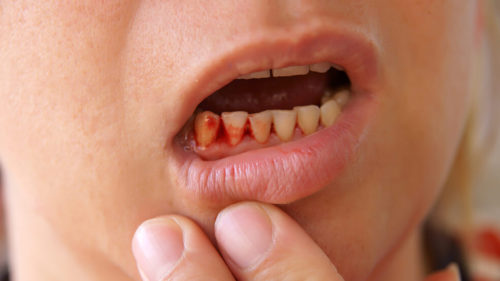Bleeding gums

If you often notice blood stains on your washbasin while you are brushing or flossing, then don’t shrug it off as a small problem as it may turn out to be more serious than you might think. Bleeding gums is an early sign of various gum diseases and infections that wreak havoc on your oral health. If not treated on time, these infections can advance to much severe diseases and may even lead to erosion of jawbone and tooth loss.
Bleeding gums is often a result of bacterial infection or dental injury caused due to vigorous brushing and flossing, but it may also be an early sign of other health conditions. Some of the causes of bleeding gums are listed below:
Gingivitis
Number one cause of bleeding gums in adults, Gingivitis is a gum disease caused due to accumulation of plaque (debris and bacteria) on your teeth and the gum line, leading to infection. The infection makes the gums tender and causes bleeding, irritation, redness and swelling. Poor oral hygiene and chewing tobacco are major reasons behind developing Gingivitis.
Periodontitis
When Gingivitis is left untreated, it progresses to a much serious gum disease called Periodontitis. In this disease the bacteria grows in the mouth and causes gums to separate from teeth, leading to falling out of teeth.
Medications
Several medications interfere with the saliva flow and leads to dryness in the mouth. Dry mouth makes our gums and teeth more susceptible to infection.
Injury
Cuts and injuries caused due to hard bristles of toothbrush or tight dentures can also cause gum bleeding. If not treated and cleaned on time, these injuries can get infected.
Vitamin Deficiency
An unbalanced diet, deficient in Vitamin C can cause bleeding in gums. Lack of Vitamin K decreases the clotting of blood.
Chronic Diseases
Bleeding gums may are the warning signs for many serious diseases like hemophilia, leukemia and diabetes. So, if you experience bleeding gums, it’s essential to see a doctor as soon as possible.
Conclusion
Wrapping up to the conclusion, bleeding from the gums is the sign of a problem which requires attention and diagnosis from a dental professional. Daily removal of bacterial plaque, along with regular periodontal cleanings will enable you to have a healthy mouth with healthy teeth and gums.
Disclaimer: This content including advice provides generic information only. It is in no way a substitute for qualified medical opinion. Always consult a specialist or your own doctor for more information.
